- About Us
- Cell Therapy
- Neurology
- Disorders
- Services
- All Therapies
- Regenerative Rehabilitation
- Rehabilitation for Stroke
- Rehabilitation for Spinocerebellar Ataxia
- Parkinson’s Disease Rehabilitation
- Multiple Sclerosis Rehabilitation
- Rehabilitation for Spinal Cord Injury
- Rehabilitation for Motor Neuron Disease
- Rehabilitation for Cerebral Palsy
- Brachial Plexus Injury rehabilitation
- Rehabilitation for Global Developmental Delay
- Childhood Disorders Clinic
- Outpatient Services
- Ask a question
- Request an appointment
- About Us
- Cell Therapy
- Neurology
- Disorders
- Services
- All Therapies
- Regenerative Rehabilitation
- Rehabilitation for Stroke
- Rehabilitation for Spinocerebellar Ataxia
- Parkinson’s Disease Rehabilitation
- Multiple Sclerosis Rehabilitation
- Rehabilitation for Spinal Cord Injury
- Rehabilitation for Motor Neuron Disease
- Rehabilitation for Cerebral Palsy
- Brachial Plexus Injury rehabilitation
- Rehabilitation for Global Developmental Delay
- Childhood Disorders Clinic
- Outpatient Services
- Ask a question
- Request an appointment
Be Unstoppable!
Opt for Brachial Plexus Injury treatment
When you grab a pan your brachial plexus tells you if it’s too hot to hold. If you’re reading this blog on your mobile or on your computer, you’ve typed your search words with your wrist and fingers. Your brachial plexus helps you with this too. The brachial plexus carries messages (sensory and movement signals) from the spinal cord to the arms and hands.
So, what happens when you’re unable to even lift the pan? What if you cannot type on your keyboard? Could it be a sign of brachial plexus injury?
At Plexus Bangalore and Hyderabad, we assure you timely diagnosis and immediate rehabilitation for brachial plexus injury from world-renowned neurologist Dr Na’eem Sadiq.
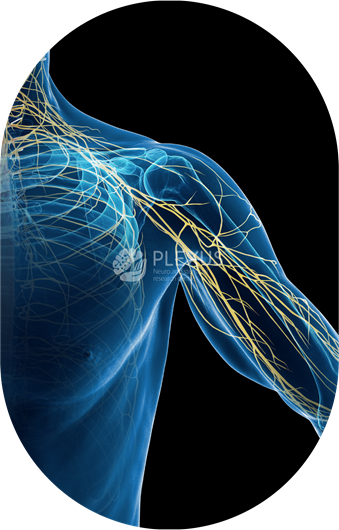

What is Brachial Plexus Injury ?
The brachial plexus is a network of nerves that originate in the neck and shoulder area, extending into the arm. These nerves control the muscles of the arm and hand, making them essential for various functions, including movement and sensation. Brachial Plexus Injury occurs when these nerves are stretched, compressed, or in the most serious cases, ripped apart or torn away from the spinal cord.
Causes of Brachial Plexus Injuries
Brachial plexus injuries can occur as a result of various factors, such as:
Severity of Brachial Plexus Injuries
Minor injuries
Very often brachial plexus nerves get stretched or compressed due to minor scuffles in contact sports like football or wrestling. These are called stingers or burners that exhibit symptoms such as:
- Burning sensation
- Numbness
- Weakness in the affected area.
Major injuries
A major injury to the brachial plexus occurs when the nerve root is torn from the spinal cord. Symptoms for such major injuries include weakness or inability to use certain muscles in your hand, arm, or shoulder along with severe pain.
While minor injuries to the brachial plexus can heal easily, severe injuries can lead to paralysis.
Symptoms of Brachial Plexus Injuries
Depending on the severity and location of the Brachial Plexus Injury, the signs and symptoms can vary greatly.
Below are some of the most common symptoms of brachial plexus injury:
Types of Brachial Plexus Injury
Injury of the upper brachial plexus nerves results in Erb’s Palsy. It causes numbness and loss of motion around the shoulder and an inability to flex the elbow, lift an arm, or bring objects to the mouth.
It is a less common injury affecting the lower brachial plexus, leading to loss of motion and/or sensation in the wrist and hand, such as being unable to move fingers.
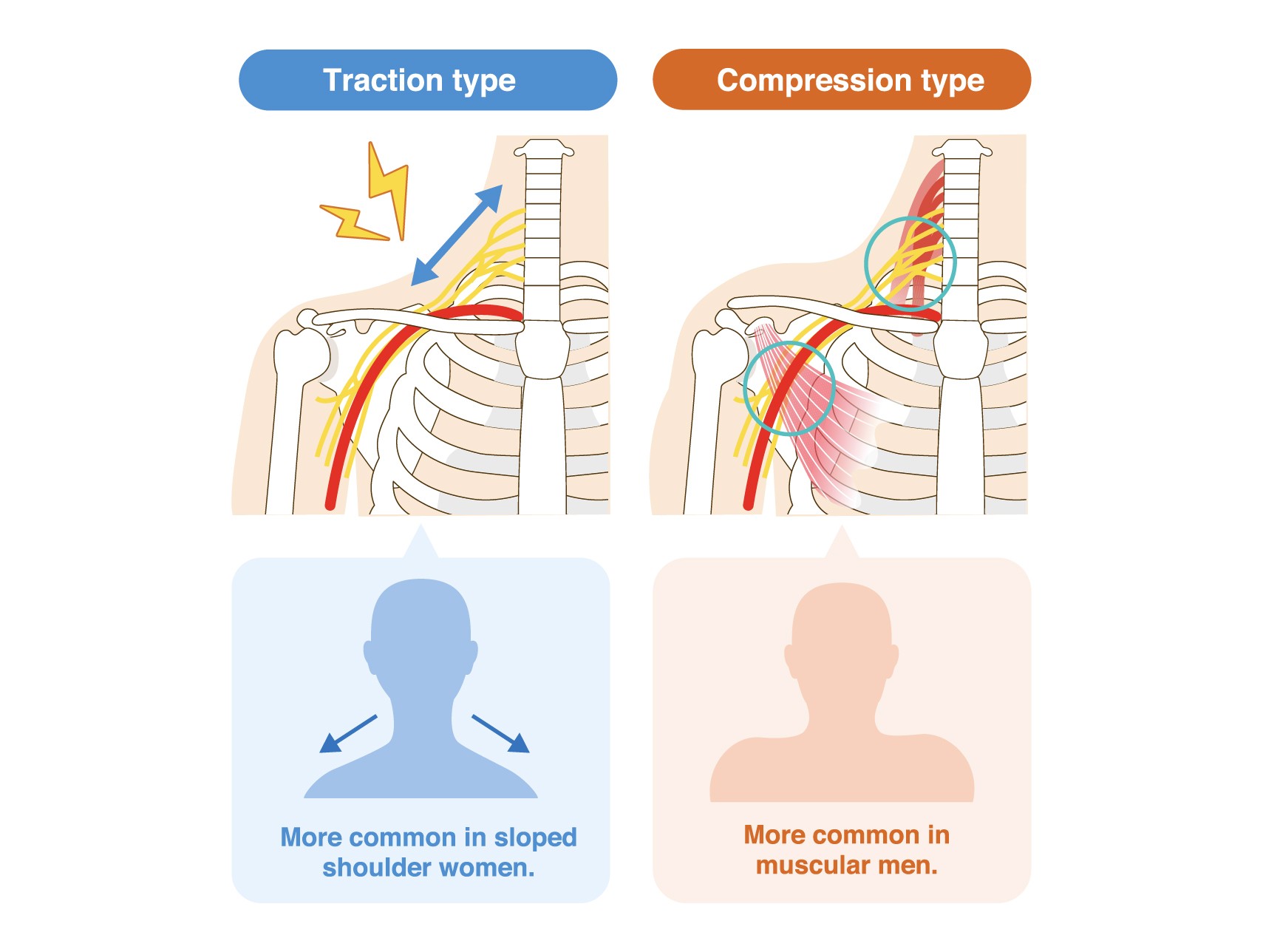
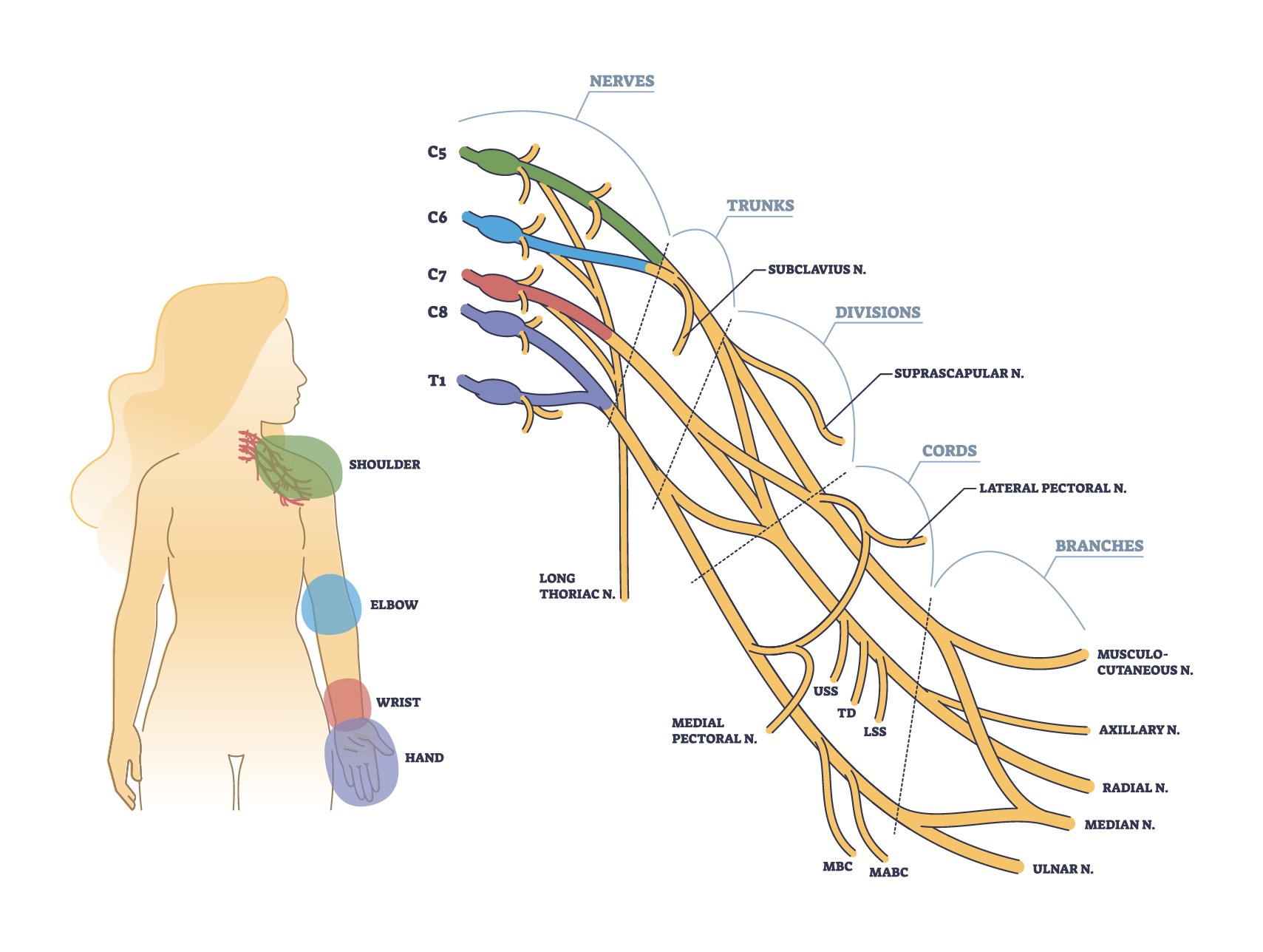
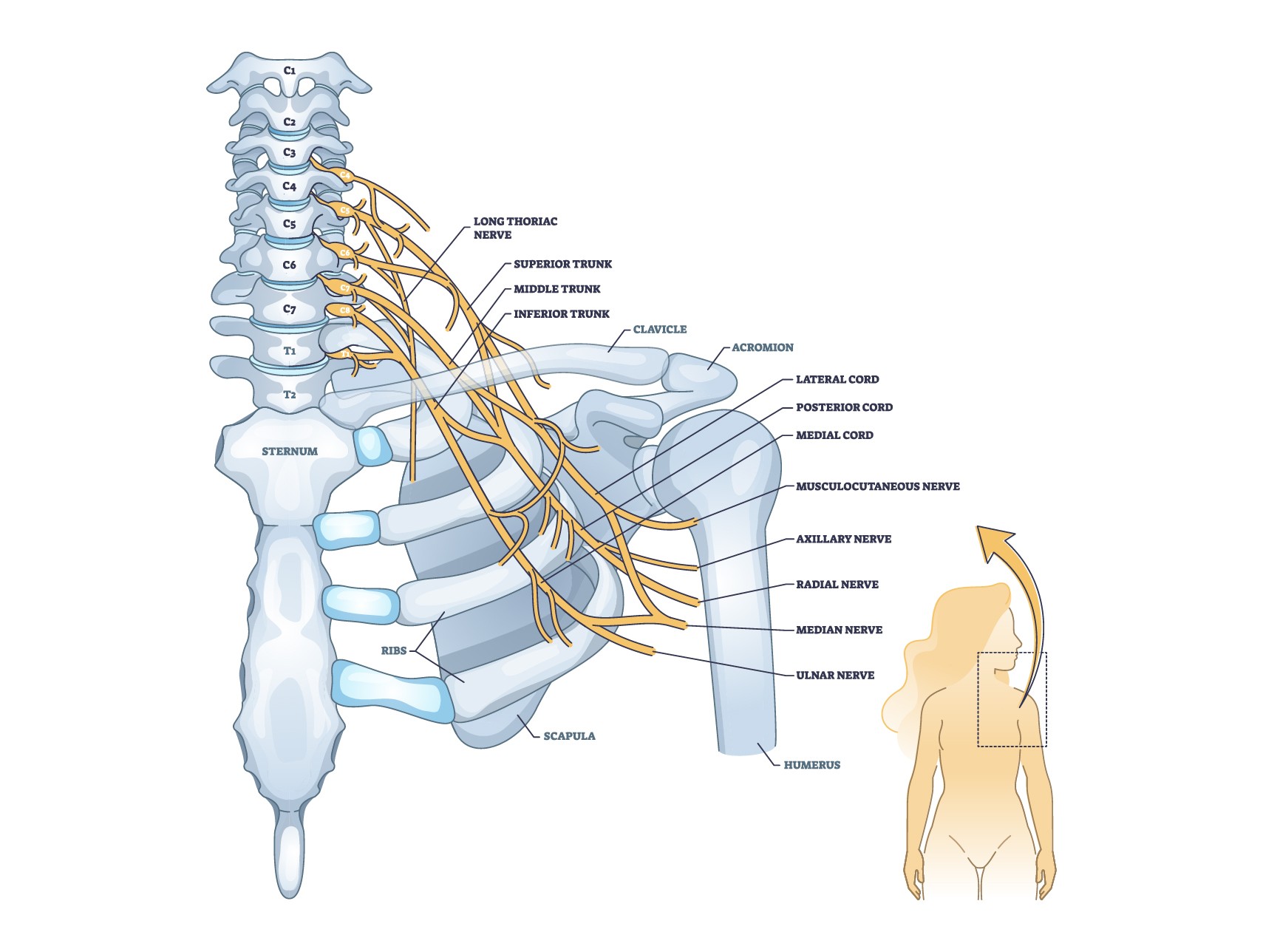


Best Brachial Plexus Injury Treatment in India
Plexus Regenerative Rehabilitation for Brachial Plexus Injury
At Plexus Bangalore and Hyderabad, we offer holistic regenerative rehabilitation programs for brachial plexus injury that includes:
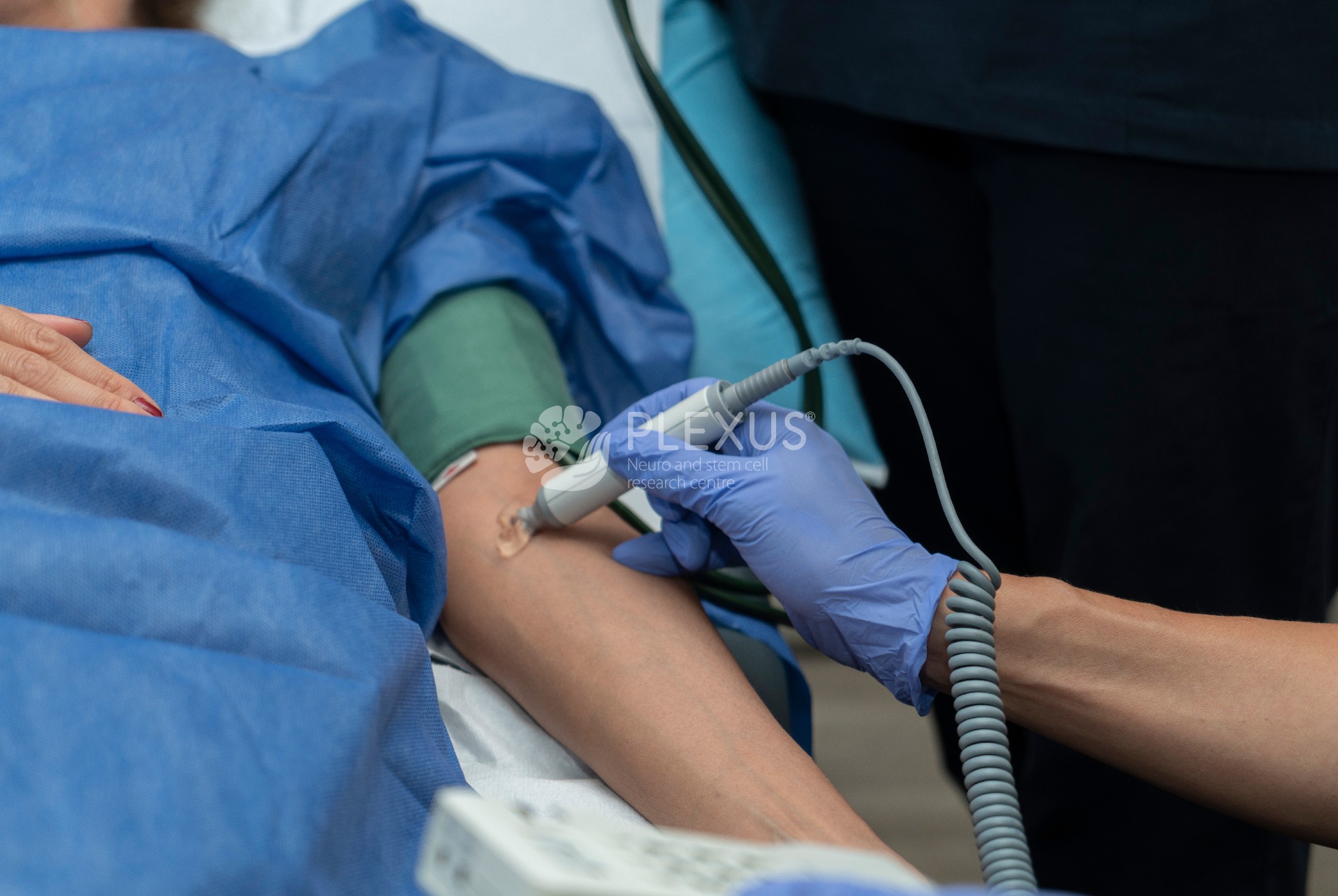
Cell therapy
Mesenchymal cells promote the regeneration of damaged nerves in the brachial plexus, and help restore sensory and motor function. Additionally, they also help reduce inflammation and the formation of scar tissue, both of which impede nerve growth.
Physical Therapy
Physical therapy focuses on improving the strength of affected muscles, relieving pain, and improving muscle tone and sensory awareness of the extremity. Our physiotherapists will draw up an exercise plan based on the patient’s condition and individual goals. These exercises can include:
- Strengthening Muscles: Enhancing muscle strength to support better posture and movement.
- Range of Motion: Increasing the range of motion in joints to promote flexibility.
- Balance and Coordination: Working on balance and coordination to prevent falls and enhance functional abilities.
- Pain Management: Addressing pain issues associated with muscle weakness and reduced mobility.
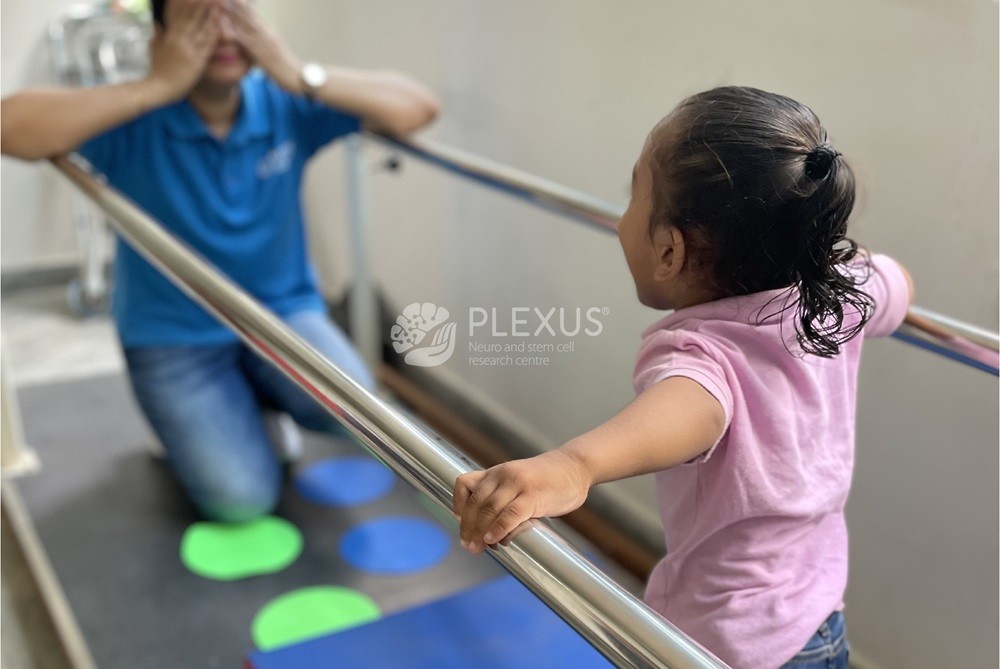

Occupational Therapy
The goal of Occupational Therapy is to enhance daily life skills like eating, dressing and cooking in cases that involve severe muscle weakness, numbness, and pain. It consists of a number of treatment approaches that help to improve the functioning of the affected area. These include muscle re-education and retraining therapy, sensory re-education therapy, mirror therapy, hand function training, ADL training, hand splinting, and improvement of play skills in children.
Patients with brachial plexus injuries are at high risk of developing contractures that can turn into fixed deformities over time. Our in-house splinting facility helps prevent and correct these contractures, while simultaneously improving the functioning of weakened muscles.
Additionally, we also offer sensory re-education therapy to help you retrain your sensory pathways, adapt to changed abilities, and regain function.
To know more about our brachial plexus rehabilitation programs, visit Plexus Bangalore or Hyderabad today.
What our patients say

Ramanujan (name changed)
“I believe that Dr Na’eem Sadiq is an amazing doctor with a friendly, warm attitude. His care towards his patients is commendable and he is a great listener. He explains to his patients and their family in the most simple terms about the root cause of problems and provides a comprehensive treatment for them. We came to India from the US to get Cell Therapy for our son with Autism.
We sincerely thank Dr Na’eem Sadiq and his staff. It was a wonderful journey with you. Keep up the good work! I will recommend Plexus to all my family and friends.”

Priyanka Reddy (Name changed)
“My experience with Plexus has been pleasant. Dr Na’eem and his staff members have been helpful and they treated my son who was suffering Sensory Processing Disorder wholeheartedly. I am glad I found this center as it helped my son recover as soon as possible.”

Rohini, mother of baby Abhiraj (name changed)
“We went to Plexus for treatment of my child’s hand. My 2-month-old baby was not moving his right hand and his right side looked weak and different from the left. At Plexus his treatment was carried out for one month and he completely recovered after that. He started holding his toys and started moving his right arm. I am extremely grateful to the doctors at Plexus for improving my child's condition.”

Dhruv Singh (name changed)
“After my injury, my hand was paralyzed and there was no sense in my entire arm and hand. I took Cell therapy, physiotherapy, and occupational therapy at Plexus and saw a great improvement in the sensation and movement of my hand. I even attempted to drive a car and was successful. I thank Dr Na’eem and his team for providing me with the best form of treatment for my injury.”











